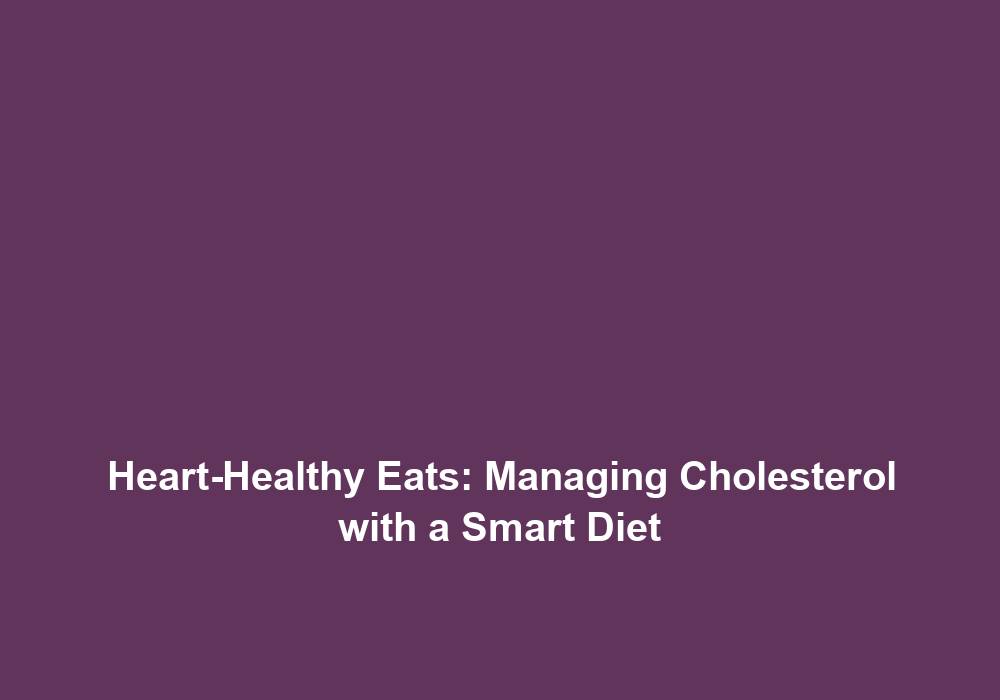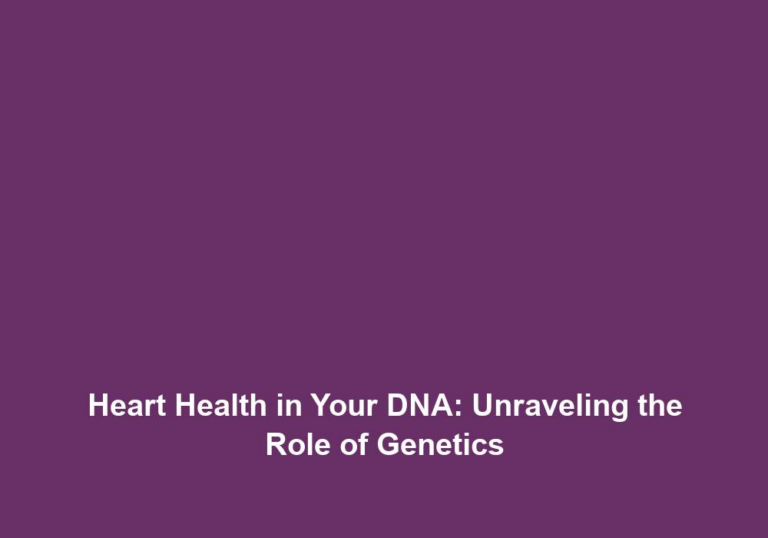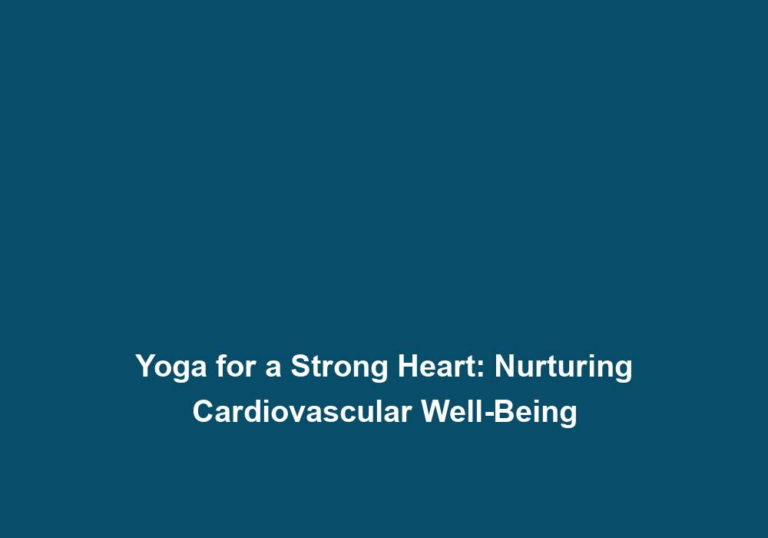Heart-Healthy Eats: Managing Cholesterol with a Smart Diet
High cholesterol levels can pose a significant risk to our heart health. Fortunately, by making smart dietary choices, we can effectively manage our cholesterol levels and promote a healthy heart. In this article, we will explore various foods and eating habits that can help us maintain optimum cholesterol levels and reduce the risk of heart disease.
Understanding Cholesterol
Before delving into the specifics of a heart-healthy diet, it’s essential to understand what cholesterol is and how it affects our bodies. Cholesterol is a waxy substance that is produced naturally by our liver and is also present in certain foods. While our bodies need cholesterol for various functions, excess cholesterol can accumulate in our arteries, leading to atherosclerosis, a condition where the arteries become narrowed and hardened.
There are two types of cholesterol: low-density lipoprotein (LDL), often referred to as bad cholesterol, and high-density lipoprotein (HDL), known as good cholesterol. LDL cholesterol contributes to plaque formation in the arteries, while HDL cholesterol helps remove excess cholesterol from the bloodstream.
The Role of LDL and HDL Cholesterol
LDL cholesterol, also known as bad cholesterol, can build up in the arteries, leading to blockages and increasing the risk of heart disease. On the other hand, HDL cholesterol, or good cholesterol, helps remove LDL cholesterol from the bloodstream, reducing the risk of heart disease. It is important to maintain a balance between the two types of cholesterol to promote a healthy heart.
The Impact of Diet on Cholesterol Levels
Diet plays a crucial role in managing cholesterol levels. By making informed food choices, we can effectively lower LDL cholesterol levels and increase HDL cholesterol levels. Incorporating specific nutrients and foods into our diet can have a positive impact on heart health.
Dietary Guidelines for Managing Cholesterol
Following a heart-healthy diet involves making conscious choices to reduce LDL cholesterol levels and increase HDL cholesterol levels. Here are some dietary guidelines to consider:
1. Emphasize on Omega-3 Fatty Acids
Omega-3 fatty acids are essential fats that provide numerous cardiovascular benefits. They help reduce inflammation, lower blood pressure, and decrease triglyceride levels, all of which contribute to a healthier heart. Include fatty fish like salmon, mackerel, and trout in your diet, as well as plant-based sources such as walnuts, flaxseeds, and chia seeds. These foods are rich in omega-3 fatty acids and can be easily incorporated into meals.
2. Increase Fiber Intake
A high-fiber diet can effectively lower cholesterol levels and promote heart health. Soluble fiber, in particular, forms a gel-like substance in the digestive system that helps prevent cholesterol absorption. Foods rich in soluble fiber include oats, barley, legumes, fruits, and vegetables. By including these fiber-rich foods in your meals, you can improve heart health and manage cholesterol levels effectively.
3. Choose Healthy Fats
While it’s important to limit saturated and trans fats, not all fats are bad for you. Opt for monounsaturated and polyunsaturated fats found in olive oil, avocados, nuts, and seeds. These healthy fats can help improve cholesterol levels when consumed in moderation. They also provide essential nutrients and contribute to overall heart health.
4. Incorporate Plant Sterols
Plant sterols are compounds found in plants that have been shown to reduce LDL cholesterol levels. Including plant sterols in your diet can be an effective strategy for lowering cholesterol levels. Fortified foods like margarine, orange juice, and yogurt often contain added plant sterols. By incorporating these foods into your diet, you can benefit from their cholesterol-lowering effects.
5. Limit Added Sugars and Refined Carbohydrates
A diet high in added sugars and refined carbohydrates has been linked to increased cholesterol levels and a higher risk of heart disease. To manage cholesterol effectively, it is important to limit your intake of sugary beverages, processed snacks, white bread, and sugary desserts. Instead, focus on consuming whole grains, fruits, and natural sweeteners like honey or maple syrup. These foods provide essential nutrients and promote heart health.
6. Include Lean Proteins
Protein is an important component of a heart-healthy diet, but it’s crucial to choose lean sources of protein. Opt for skinless poultry, fish, legumes, and low-fat dairy products as they are low in saturated fat, which can help maintain healthy cholesterol levels. These protein sources also provide essential nutrients and contribute to overall heart health.
7. Incorporate Antioxidant-Rich Foods
Antioxidants play a key role in reducing inflammation and oxidative stress in the body, both of which contribute to heart disease. Including a variety of colorful fruits and vegetables in your diet ensures an adequate intake of antioxidants. Berries, leafy greens, bell peppers, and tomatoes are excellent choices. These foods are rich in antioxidants and provide numerous health benefits, including heart health.
8. Cook and Prepare Food Healthily
The cooking and preparation methods used can greatly impact the healthiness of a meal. Opt for grilling, baking, or steaming instead of frying. These cooking methods help retain the nutrients in the food and minimize the use of unhealthy fats. Avoid using excessive amounts of oil, butter, or salt in your cooking. By adopting healthier cooking techniques, you can maximize the nutritional value of your meals while reducing the intake of unhealthy fats and excessive sodium.
Conclusion
Maintaining a heart-healthy diet is crucial for managing cholesterol levels and reducing the risk of heart disease. By incorporating omega-3 fatty acids, fiber, healthy fats, plant sterols, lean proteins, and antioxidants into our meals, we can effectively improve our cardiovascular health. Additionally, limiting added sugars, refined carbohydrates, and using healthy cooking methods can further enhance the benefits of a smart diet. Take charge of your heart health today by making informed food choices and prioritizing a heart-healthy lifestyle.







